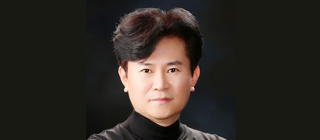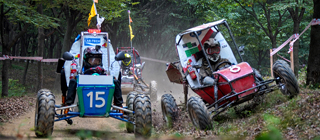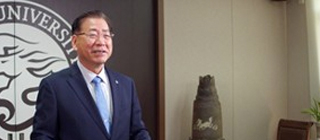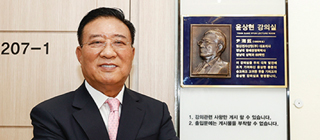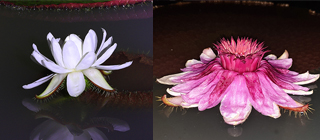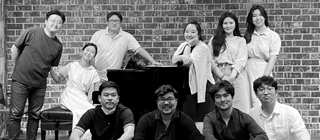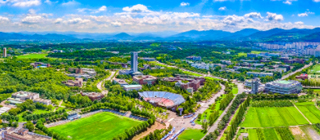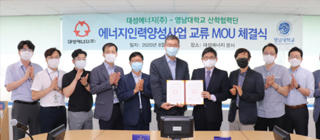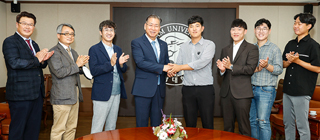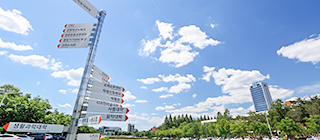-
Two-year term until June 2022 Expert architecture organization for exchange and cooperation among experts for developing in the architectural design sector “Pursuing social values as experts such as professors and architects, and leading the globalization of Korean architecture” [September 1, 2020] YU School of Architecture Professor Baek Seung-man (55) was appointed as the chairperson of the Architecture Design Institute of Korea. The term is two years from July 2020 to June 2022. The Architecture Design Institute of Korea began as the Educators of Architecture Design Association in May 2002 and developed into the Architecture Design Institute of Korea in May 2016. It is an organization that conducts academic, art and technological research for the development of the domestic architecture design sector and conducts exchange and cooperation among various experts to practice education and practical work in architecture. Its goal is to contributing in creating a healthy architectural culture by widely spreading the issues that the Korean architectural industry faces to the public as well as experts through academic conferences, exhibits, publications, etc. from a future-oriented perspective. The new chairperson Baek Seung-man said, “The Architecture Design Institute will gather its various architectural experiments and passion that is has built up for almost the past 20 years and do its best to be reborn into a more mature and creative specialized association,” while adding, “Rather than pursuing biased collective interest, I will work toward creating an organization that realizes social values and globalization as experts.” He added, “We will continue working on preparing for a better future for Korean architecture without losing our fundamental goal despite the unstable conditions due to the global COVID-19 pandemic.”
-
15 teams from 13 universities compete at the YU Gyeongsan Campus from the 19th to 22nd General evaluation on design, safety, braking, durability, etc. - Ajou University ‘A-FA’ team wins first place overall Gained experience through the contest by completing design and production [August 22, 2020] <2020 Baja SAE Korea (Durability Test)> The 2020 Baja SAE Korea at Yeungnam University’ closed its curtains on the 22nd after four days of fiery passion. This was the 25th anniversary of this contest and a total of 15 teams from 14 universities including Kyonggi University, Ajou University and Korea Aerospace University faced off against each other. On the first day of the competition on the 19th, the competing vehicles were moved in, training for volunteers was held, and the best papers were presented. On the second day at 9 a.m., the participants completed registration and static tests to check the vehicle design’s creativity, safety, ease of maintenance, possible for mass production, etc., and basic driving inspections and rule meetings were held. On the 21st, which was the third day of the event, an official opening ceremony was held with the attendance of all the participating teams, volunteers, sponsors, etc. at the main field, and the participating teams held a car parade all around the YU campus. Dynamic tests on acceleration, max speed, rock climbing, and passing mud were held in the afternoon. On the last day of the event, which was the 22nd, the highlight of the competition, which was the durability test, was held on the offroad at the mountain behind the YU water purification tank. <2020 Baja SAE Korea participants> <2020 Baja SAE Korea - Dynamic Test)> At this contest, the Ajoun University ‘A-FA’ team took overall first place, followed by ‘Speeding’ team of Keimyung University in second and ‘TU-A.M.G’ team of Tongmyong University in third place. YU Department of Automotive Engineering Professor Hwang Pyeong, who has been overseeing this contest for the past 25 years, said, “It is disappointing that not many domestic and foreign universities were able to participate due to the global COVID-19 pandemic. Despite the difficult conditions, the participants who worked hard for this contest had a valuable opportunity for experience and learning throughout the course of this contest.” He added, “The experience for students conducting research for automobile design and production, and competing in the competition will be greatly important assets for their future.” The YU Baja SAE Korea is a contest where college students compete in making their own automobiles and it first began in 1996. In 2001, it was the first in Korea to receive approval from the US Society of Automotive Engineers (SAE) and it was promoted into an international contest, which is held every year by YU.
-
-
Commerce and Economics Hall 207-1 designated as classroom named after Ilshin Electronics CEO Yoon Sang-hyeon Alumni of the Department of Commerce (currently Business Administration) from the class of ‘69, contributions to social development as an entrepreneur Extraordinary love for alma mater and juniors... Donated 300 million KRW for development funds [August 19, 2020] A lecture hall in YU was named after Yoon Sang-hyeon (70), CEO of Ilshin Electronics This is to commemorate his large donations to the development funds of YU and his contributions to social development as an entrepreneur. At 11:30 a.m. On the 19th, YU held a naming sign ceremony of the ‘Yoon Sang-hyeon Classroom’ at 207-1 of the Commerce and Economics Hall. A copper naming plate including a relief of Mr. Yoon’s face, history, and achievements was placed on the right-side wall at the door of the classroom. Mr. Yoon is from the YU Department of Commerce (currently Business Administration) class of ‘69. Mr. Yoon started up Ilshin Trading in 1978 and paved the foundations for insulation products and then founded Ilshin Electronics in 1991, creating a company that manufactures, sells and forwards electric and electronic parts. In 2002, he received the ‘Proud Korean Award’ from the Journalists Federatoin of Korea’, the ‘5th Yeongsang Academy CEO Award’, ‘designated as Model Taxpaying Company by the National Tax Service in 2005, and the ‘Korea Trade Research Association CEO Award’ also in 2005. In recognition of his contributions as an entrepreneur that contributed to the economical growth of the nation, he was bestowed an honorary PhD in business administration from YU in 2011. Mr. Yoon attended this ceremony and said, “It is an honor to see my name being placed on a classroom on the campus where I spent my younger ages dreaming.” He added, “The development of the university is essential to help students grow and develop to fulfill their roles in society, and I believe that this will lead to the development of our society and country. I hope that the students who study in this room will have big dreams and become leaders of the Republic of Korea in the future.” Mr. Yoon is famous for his extraordinary love for his alma mater and juniors at YU. He donated over 300 million KRW in development funds to YU so far and he has also been providing generous support both physically and psychologically by utilizing the YU alumni network. In particular, he took on the role of the chairman of the YU Finance and Economics Alumni Association from 2010 to 2018 where he played a centrifugal role for YU alumni in the Seoul area. The Finance and Economics alumni homecoming that began in 2011 and the ‘Cheonma Employment Alumni Welcoming Meeting’ held every year in Seoul since 2012 that Mr. Yoon initiated have become the most famous events of the YU Finance and Economics Alumni Association. Recently, he founded the ‘Cheonma Humanities School’ helping his juniors gain insight in the humanities. YU President Sur Gil-soo said, “The entrepreneur spirit that our senior alumni achieved and the practice of devotion and sharing to the society should be passed on to our juniors studying at the ‘Yoon Sang-hyeon Classroom.” He added, “In accordance with the founding spirit of YU to foster ‘Pillars of National Revival’, we hope that YU students will contribute to social development and become members of society that practice sharing.” Meanwhile, YU has designated and is operating classrooms named after large donors to the university’s development fund since 2018, and the ‘Yoon Sang-hyeong Classroom’ is the sixth designated classroom.
-
Second year of offering exotic scenery where the flowers bloom over three days The flowers that bloom on the second day said to look similar to the crown of Queen Victoria, and thus, the flowering process called ‘coronation’ YU Mirror Pond embroidered with rare lotus flowers and water lilies... Frequently visited by students and visitors for a place to relax [August 7, 2020] <Victoria Lotus Flowers in blossom at the YU Mirror Pond (left: first day, right: second day of blossom)> This is the second year where the ‘Victoria Lotus Flowers’ blooming in the YU Mirror Pond for the second straight year. Victoria lotus flowers are tropical nymphaeaceae plants that grow in the South American Amazon River. In 1836, the British botanist Lindle Lee brought the seeds to England and succeeded in blooming the flower after about 10 years, and it was named Victoria Regia being named after Queen Victoria who just took the throne. Afterwards, its name was changed to Victoria Amazonica and a different species that grow in Paraguay is called Victoria Cruziana. The Victoria lotus is very popular especially among photographers for the size of its leaves, structures, change in flower gender, scent, and pollination features. In particular, the blooming process called ‘coronation’ is also worthy of attention. Victoria lotus flowers bloom for three days and blooms in the night and closes in the morning. On the first day, it emits a deep pineapple scent from its ivory colored flower, and then goes back to sleep early on the next day, and then on the second night, it become a pink flower with an appearance like a crown. And then it disappears into the water early on the third day. It is said that the flowers that bloom in the second day look similar to the crown of Queen Victoria and the blossoming process is called ‘coronation’. The Victoria lotus is female on the first day and then turns into a male flower on the second day. In its indigenous habitat, certain inspects are in charge of its pollination, but it has been reported to be very difficult to pollinate in places outside of its original habitat. The Victoria flowers that blossomed at the YU Mirror Pond is even more meaningful because seeds were collected in October after artificial pollination in August of last year, and it was sowed in February of this year. <White Nymphoides indica in blossom at the YU Mirror Pond> Various lotus flower and water lilies grow at the YU Mirror Pond, and in the summer, a variety of flowers take turn blooming both in the day and night. There are more than ten types of temperate and tropical water lilies including around 10 lotus flowers that bloom at night including the Beopsu red lotus and Banyaweol red lotus. It is also home a number of other aquatic plant life such as water poppy, gold lotus, fox nut, red least water lily, papyrus, water calla, loosestrife, etc. In particular, thousands of white Nymphoides indica that have recently seen sharp decrease in numbers can be found in colonies here at the YU Mirror Pond. YU School of Chemistry and Biochemistry Professor Han Sung-soo breeded mass amounts of it and transplanted them in the Mirror Pond. YU plans to give the white Nymphoides indica to children for free. The first parcels will be from August 12 (Wed) - 16 (Sun), second will be from the 19th (Wed) to 23rd (Sun from 5 p.m. to 8 p.m. Children who want to receive the flower can get theirs for free by bring five plastic coffee cups to the Mirror Pond. <Night-blooming flowers at the YU Mirror Pond>
-
Scheduled to deliver a message of hope to overcome difficulties with beautiful melodies under the theme ‘Reverberation and Sharing’ Plans to broadcast the concert live via the YU YouTube channel for the untact age [July 21, 2020] The YU College of Music will hold the ‘Overseas Alumni Invitational Concert’ to commemorate the 73rd year anniversary of the school and to offer healing with music in the tough conditions due to COVID-19 at 7:30 p.m. on July 23 at the YU Cheonma Art Center Grand Hall. This concert will be the first concert for the YU College of Music’s Major of Voice and plans are to hold concerts every year with alumni and students. This concert that will be held under the theme ‘reverberation and sharing’ plans to deliver a message of hope for overcoming past hardships and to welcome the new age through the medium of voice that has beautiful musical reverberations. In particular, it will be aired lived on the YU YouTube channel so that it can be enjoyed by a wider audience in the untact age, and the concert hall will be arranged according to the government’s social distancing policies. This was organized by the YU College of Music Major of Voice and alumni who are actively performing abroad will team up to participate in this recital. In particular, Baratone Lee Dong-hwan (Voice, class of ‘00) who swept the Belvedere and Vinas International Concours and is performing at a major opera theater in Germany, Bass Lim Chae-joon (Voice, ‘01) who took first place in the JoongAng Music Concours and then studied in Italy where he was awarded at the Domingo and Bilbao Concours and is performing in the global arena, Baritone Seo Jeong-hyeok (Voice, ‘04) who was recently selected as a young Korean singer who shined in the global opera world by Auditorium Magazine, Tenor Lee Beong-ryong (Voice, ‘04) and other YU alumni who who are currently studying at national music schools in Italy will appear to offer beautiful and romantic reverberations.
-
13 research teams selected, 30.7 billion KRW in national funding for 7 years, Largest among private universities outside of the capital region Fostering research professionals through graduate student research scholarships and new researcher support Selected since stage 1 in 1999 thus being selected for all 4 stages of the BK21 project [August 7, 2020] A total of 13 research teams of YU (President Sur Gil-soo) was pre-selected for fourth stage of BK21 (Brain Korea21) hosted by the Ministry of Education. It is the highest number among private universities outside of the capital region. With the selection for this project, YU will receive approximately 30.7 billion KRW in the project expense from September 2020 for about seven years, making it possible to foster researchers through support such as graduate student research scholarships, new researcher wages, etc. YU projects selected were ▲the Global East Asia Innovative Personnel Fostering Education Research Team (Director Soohn Seung-hee) ▲YU Future Automobile Innovation Fostering Project Team (Director Park Sang-shin) ▲Glocal Heritage Design Youth Human Resource Fostering Project Team (Director Hong Chang-gi) ▲four research teams including the IT Energy Materials Process Future Chemical Human Resources Fostering Project Team (Director Lee Moon-yong) ▲Ultra-connected Response Optical Nano-based Future Expert Fostering Team (Team Leader Kwak Jin-seok) ▲Optical/Electric Chemical-based Energy Material Human Resource Fostering Team (Team Leader Kang Mi-sook) ▲Future-oriented Electric Energy Convergence Control Teachnology Project Team (Team Leader Park Joo-hyeon ▲Reliable SW System Convergence Team Using Big Data Analysis (Team Leader Hwang Do-sam) ▲Mobility Industry-based Materials and Parts Future Human Resources Fostering Education Research Team (Team Leader Kim Hye-gyeong) ▲4th Industrial Revolution-based Regional Specialized Future Management Fostering Project Team (Team Leader Lee Gyeong-tak) ▲‘Pro Bono’ Regional Education Innovation Human Resource Fostering Team (Team Leader Heo Joon) ▲Cultural Asset Curating Team for Regional Regeneration (Team Leader Lee Chang-eon ▲Global New Drug Development Customized Future Human Resource Fostering Project Team (Team Leader Kim Jong-oh). YU President Sur Gil-soo said, “Having the most research teams and groups among private universities outside of the capital area for the stage 4 BK21 project is the recognition of YU’s research capacities in various academic fields,” and added, “The university, graduate school and industry-academic cooperation team will provide full support to foster researchers that can contribute to the society and country.” The BK21 Project being pursued by the Ministry of Education and National Research Foundation is a large government-funded project implemented since 1999 with the goal of fostering master’s and doctorate’s degree professionals. YU was selected for all four stages of this project. In stage 4 of this project, a total of 695 research organizations and 364 research teams from 93 universities all across the nation applied, and among them, 386 research organizations and 176 research teams from 68 universities were pre-selected. Final selection will be made in September after accepting objections on conducting on-site inspections for each university.
-
Local industry-academic-research consortiums such as YU selected for the MOTIE ‘Energy Human Resources Fostering’ project Fostering experts for all cycles of the hydrogen industry [August 4, 2020] The YU Industry-Academic Cooperation Team and Daesung Energy entered a work MOU for exchange and cooperation in the energy human resources fostering project at the Daesung Energy headquarters located in Jung-gu, Daegu on the 4th. The local industry-academic-research consortium that includes the YU Industry-Academic Cooperation Team was finally selected for the ‘Gyeongbuk Hydrogen Industry Convergence Human Resources Support Project’ in the 2020 Energy Human Resources Fostering’ contest project hosted by the Ministry of Trade, Industry and Energy in early June. This MOU was pursued for the joint development and synergy effect between the YU Industry-Academic Cooperation Team, which is the supervising institute of the consortium, and Daesung Energy that is expanding its business to become a leader in the local hydrogen industry through mutual cooperation. Through this MOU, the two institutes have agreed to cooperate closely in ▲fostering experts in new hydrogen industries ▲exchange energy personnel fostering projects ▲participate in joint education and lectures ▲construct an industry-academic cooperation system and conduct industry-academic cooperative research by organizing an association, etc. Daesung Energy CEO Woo Jung-bon said, “As the transition to the hydrogen economy is accelerating, fostering experts has become crucial,” and added, “I hope that this MOU will serve as a primer for the development of the hydrogen industry by strengthening mutual cooperative systems and we expect various synergy effects to be created.” Park Jin-ho, the general supervisor of this hydrogen industry personnel fostering project team said, “We plan to foster outstanding personnel by offering R&DB-based projects and track curriculum for each objective in order to incubate experts for the entire cycle of the hydrogen industry.”
-
Total reduction of 4.5 billion KRW... Financial resources to be covered by cutting down on various project budgets and withdrawing from reserves 10% of tuition paid in the first semester of 2020 to be deducted in advance for the second semester tuition [August 6, 2020] YU (President Sur Gil-soo) decided to return 10% of tuition back to the students. Those subject to the reduction are students who enrolled for the first semester of 2020. The refund will be for 10% of the actual paid amount per student for the first semester tuition, and it will be returned by deducting from the tuition for the second semester. Those scheduled to graduate in 2020 will receive the amount to the individual bank accounts before graduation. The tuition discount is worth a total of about 4.5 billion KRW. To appropriate for the tuition discount, YU plans to cut down on various project budgets, draw from its reserves, and utilize scholarships, etc. YU also paid out a special scholarship totaling 2 billion KRW by paying 100,000 KRW each to its approximately 20,000 students back in May. <From fourth on left - YU President Sur Gil-soo, Student Council President Park Jong-joo> YU Student Council President Park Jong-joo said, “All of the students had a hard first semester due to the unprecedented situation of COVID-19. During the past semester, the Student Council worked hard to represent the voices of the students.” He added, “We were able to bring about positive results as everyone at the university worked together despite the difficult situation. The Student Council will take the lead to help students study in a better environment.” YU President Sur Gil-soo said, “I am well aware that students are facing financial and psychological difficulties as the COVID-19 situation prolongs.” It is a tough time for the university as well, but we decided to cut tuition for next semester to overcome COVID-19 together with the students. YU will do its best to provide administrative and financial support so that students can focus on their studies.” Meanwhile, YU is constructing an educational and research environment infrastructure to ensure the rights to study for students, while also striving to provide administrative students amidst the COVID-19 pandemic. In addition to the regular curriculum, we have constructed an infrastructure to allow various extracurricular programs such as employment support programs to be conducted in real-time online. Library book delivery services implemented in the first semester and psychological quarantine consulting to beat COVID blues were also received well by students.
-
In the 2020 Leiden Ranking, proved world-class research capacities and took first place for six straight years Received good scores in various academic sectors such as 13th overall in Korea and 9th in life & earth sciences Excluded qualitative elements such as university reputation and focused on achievements and quality of research [July 17, 2020] 2020 Leiden Ranking in Mathematics & Computer Science 2020 Overall Leiden Ranking Korea ranking University Korea ranking University 1 YU 1 UNIST 2 UNIST 2 POSTECH 3 Sejong University 3 Sejong University 4 Kyunghee University 4 KAIST 5 POSTECH 5 Ulsan University 6 KAIST 6 Seoul National University 7 Ewha Womans University 7 Hanyang University 8 Korea University 8 Korea University 9 Ajou University 9 Sungkyunkwan University 10 Dongguk University 10 GIST 11 Chung-Ang University 11 Yonsei University 12 Seoul National University 12 Ewha Womans University 13 Sungkyunkwan University 13 YU 14 GIST 14 Kyunghee University 15 Kyungpook National University 15 Dongguk University 16 Ulsan University 16 Ajou University 17 Catholic University 17 UST 18 Dankook University 18 Jeonbuk National University 19 Yonsei University 19 Chonnam National University 20 Sogang University 20 Kyungpook National University <2020 Leiden Ranking of universities in Korea> YU (President Sur Gil-soo) was once again proven to have world-class research capacities. YU took first place (78th in the world) in the Mathematics & Computer Science sector in the ‘2020 Leiden Ranking’. YU has been exhibiting dominating research capacities by taking first place six years in a row in the 2020 Leiden Ranking for mathematics and computer science. YU also placed 13th in the overall ranking. YU ranked 9th in Life & Earth Sciences and 24th in Physical Sciences & Engineering in the nation, thus being recognized for its extraordinary research capacities over various academic fields. YU President Sur Gil-soo said, “Yu’s research capacities have been receiving good assessments in global university rankings. We are uncontested in math and computer science, ranking first in the nation, and we also receive good evaluations in various other academic fields.” He added, “YU will spare no support to pursue world-class research capacities.” The Leiden Ranking is a world university ranking by Leiden University of the Netherlands that evaluates the research capacities of university research capacities based on the qualitative levels of research papers. It excludes subjective qualitative evaluation elements such as university reputation, and ranks universities based on the number of theses and frequency of citation, and therefore, it is judged to be an important indicator for assessing the research outcomes of universities and the quality of the research. This year, it evaluated a total of 1,76 universities around the world that published a minimum of 800 studies over a period of four years from 2015 to 2018. 44 Korean universities were included in this. Leiden Ranking awards the overall ranking and a total of five sectors such as Mathematics & Computer Science, Biomedical & Health Sciences, Life & Earth Sciences, Physical Sciences & Engineering, and Social sciences & Humanities.
